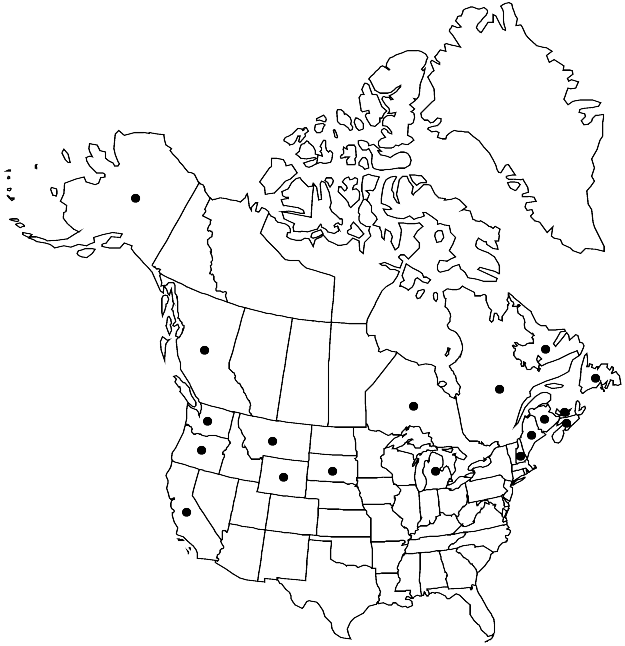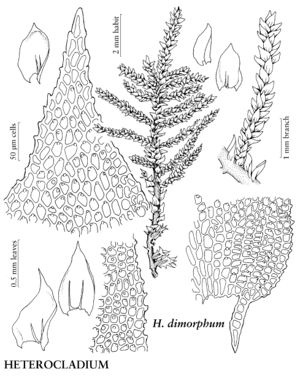Difference between revisions of "Heterocladium dimorphum"
in P. Bruch and W. P. Schimper, Bryol. Europ. 5: 153. 1852.
FNA>Volume Importer |
FNA>Volume Importer |
||
| Line 29: | Line 29: | ||
|elevation=low to high elevations | |elevation=low to high elevations | ||
|distribution=B.C.;N.B.;Nfld. and Labr.;N.S.;Ont.;P.E.I.;Que.;Alaska;Calif.;Maine;Mich.;Mont.;N.H.;Oreg.;S.Dak.;Wash.;Wyo.;South America;Europe. | |distribution=B.C.;N.B.;Nfld. and Labr.;N.S.;Ont.;P.E.I.;Que.;Alaska;Calif.;Maine;Mich.;Mont.;N.H.;Oreg.;S.Dak.;Wash.;Wyo.;South America;Europe. | ||
| − | |discussion=<p>The laminal cells of Heterocladium dimorphum are best described as prorate rather than papillose, as the papillae are at the distal ends. The prorae are much more difficult to distinguish than the papillae of H. macounii but are most clearly present and observable along the leaf margins. The stem and branch leaves also exhibit a distinct area of elongate cells in the proximal portion of the leaf around the costa extending to the insertion. These cells are smooth and larger than the quadrate laminal cells toward the margin and in the distal portion of the leaf.</p> | + | |discussion=<p>The laminal cells of <i>Heterocladium dimorphum</i> are best described as prorate rather than papillose, as the papillae are at the distal ends. The prorae are much more difficult to distinguish than the papillae of <i>H. macounii</i> but are most clearly present and observable along the leaf margins. The stem and branch leaves also exhibit a distinct area of elongate cells in the proximal portion of the leaf around the costa extending to the insertion. These cells are smooth and larger than the quadrate laminal cells toward the margin and in the distal portion of the leaf.</p> |
|tables= | |tables= | ||
|references= | |references= | ||
| Line 52: | Line 52: | ||
|publication year=1852 | |publication year=1852 | ||
|special status=Selected by author to be illustrated | |special status=Selected by author to be illustrated | ||
| − | |source xml=https://jpend@bitbucket.org/aafc-mbb/fna-data-curation.git/src/ | + | |source xml=https://jpend@bitbucket.org/aafc-mbb/fna-data-curation.git/src/8f726806613d60c220dc4493de13607dd3150896/coarse_grained_fna_xml/V28/V28_581.xml |
|genus=Heterocladium | |genus=Heterocladium | ||
|species=Heterocladium dimorphum | |species=Heterocladium dimorphum | ||
Revision as of 18:06, 18 September 2019
Stems with epidermal cells smooth. Leaves spreading to erect-appressed when dry, erect-spreading when moist; stem leaves to 1 mm; margins serrate to serrulate; apex acute; costa usually double and short to just below mid leaf; laminal cells papillose, papillae 1 at distal ends; basal cells smooth.
Habitat: Rock, soil, humus
Elevation: low to high elevations
Distribution

B.C., N.B., Nfld. and Labr., N.S., Ont., P.E.I., Que., Alaska, Calif., Maine, Mich., Mont., N.H., Oreg., S.Dak., Wash., Wyo., South America, Europe.
Discussion
The laminal cells of Heterocladium dimorphum are best described as prorate rather than papillose, as the papillae are at the distal ends. The prorae are much more difficult to distinguish than the papillae of H. macounii but are most clearly present and observable along the leaf margins. The stem and branch leaves also exhibit a distinct area of elongate cells in the proximal portion of the leaf around the costa extending to the insertion. These cells are smooth and larger than the quadrate laminal cells toward the margin and in the distal portion of the leaf.
Selected References
None.
